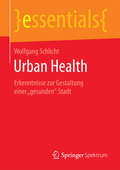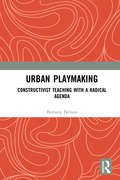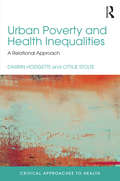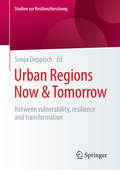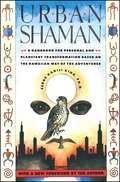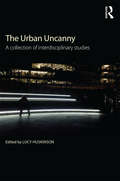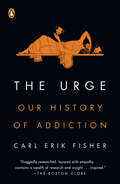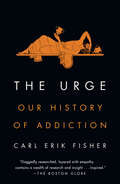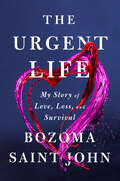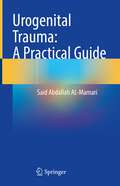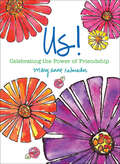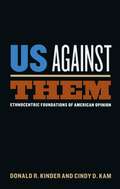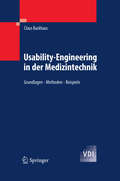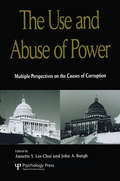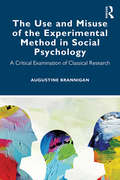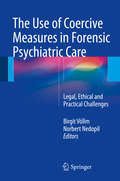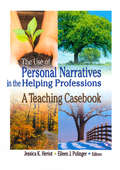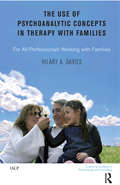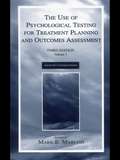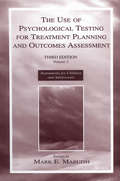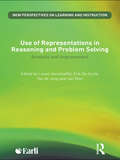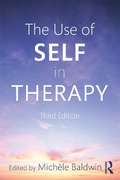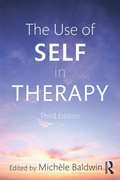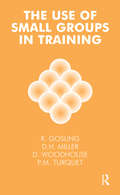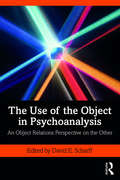- Table View
- List View
Urban Health: Erkenntnisse zur Gestaltung einer „gesunden“ Stadt (essentials)
by Wolfgang SchlichtWolfgang Schlicht stellt das Forschungsgebiet Urban Health, im Deutschen auch StadtGesundheit, vor, in dem er zu Beginn einen kurzen Abriss zur Geschichte der Stadt, zu Leitbildern der Stadtgestaltung und zu Urban Health gibt. Ausgew#65533;hlte Erkenntnisse zu Stadtmerkmalen, die Gesundheit beeintr#65533;chtigen (reaktions-orientierte Perspektive), und zu solchen, die Gesundheit f#65533;rdern (promotions-orientierte Perspektive), werden referiert. Theoretische Konzepte und methodische #65533;berlegungen zur Erkenntnisgewinnung runden das essential ab.
Urban Playmaking: Constructivist Teaching with a Radical Agenda
by Bethany NelsonThis book explores the concept of playmaking and activism through three research projects in which culturally and linguistically diverse high school students and young adults created original theatre around the issues that inform their lives and constrain their futures. Each study discussed by the author is considered through the lens of one or more best practices. The outcomes of the playmaking experiences, communicated through detailed ethnographic data and the voices of student participants, make a strong case for using what we already know about teaching to positively impact gross inequities of outcome for culturally and linguistically diverse students. This study will be of great interest to students, scholars, and practitioners in Applied Theatre, Theatre Education, and Art Therapy.
Urban Poverty and Health Inequalities: A Relational Approach (Critical Approaches to Health)
by Darrin Hodgetts Ottilie StolteWhen discussing health, we talk about ailments and afflictions, the potential of modern medicine and the behaviours that affect our health. Yet although these relationships exist, they undermine a more socio-economic understanding of health. This timely book takes a critical perspective to argue that urban poverty and health inequalities are intimately interconnected, and that the increasing disparity between rich and poor will necessarily exacerbate health issues within urban communities. Urban Poverty and Health Inequalities documents how life has become increasingly insecure and stressful for growing numbers of people due to increased insecurities in employment, income and housing, rising living costs, and the retrenchment of welfare and social services. The book explores the role of history and media depictions of poverty and health inequalities in influencing the current situation. A central objective is to advance ways to understand and respond to urban poverty as a key social determinant of health. The authors pay particular attention to the ways in which punitive responses to urban poverty are further exacerbating the hardships faced by people living in urban poverty. Looking at issues of class, age, gender, ethnic and disability-based inequalities, the book offers both critical theory and grounded solutions to enable those living in poverty to live healthier lives. The collateral damage resulting from current socio-economic arrangements reflects political choices regarding the distribution of resources in societies that needs to be challenged and changed. The authors attend to initiatives for change, offering practical responses to address urban poverty, including efforts to address wealth distribution, the potential of living wage and Universal Basic Income initiatives, social housing and anti-oppressive welfare systems.
Urban Regions Now & Tomorrow
by Sonja DeppischThis book points to three dominant concepts of how to deal with long-term or surprising and also sudden catastrophic changes, with a main focus on resilience. It is dealing with past, current and future change processes in European, Northern American as well as Australian cities and urban regions, and with the challenges they pose to a resilient urban development. Additionally, contributions deal with potential transformations of urban and regional development and related planning and governance approaches.
Urban Shaman
by Serge Kahili KingThe first practical guide to applying the ancient healing art of Hawaiian shamanism to our modern lives. Uniquely suited for use in today's world, Hawaiian shamanism follows the way of the adventurer, which produces change through love and cooperation—in contrast to the widely known way of the warrior, which emphasizes solitary quests and conquest by power. Now, even if you can't get out into the wilderness or undertake a long apprenticeship with a shaman, you can learn to practice the art of shamanism. You'll learn how to: —Interpret and change your dreams —Heal yourself, your relationships, and the environment —Cast the shaman stones to foretell the future —Design and perform powerful rituals —Shapechange —Make vision quests to other realities And more.
The Urban Uncanny: A collection of interdisciplinary studies
by Lucy HuskinsonThe Urban Uncanny explores through ten engaging essays the slippage or mismatch between our expectations of the city—as the organised and familiar environments in which citizens live, work, and go about their lives—and the often surprising and unsettling experiences it evokes. The city is uncanny when it reveals itself in new and unexpected light; when its streets, buildings, and people suddenly appear strange, out of place, and not quite right. Bringing together a variety of approaches, including psychoanalysis, historical and contemporary case study of cities, urban geography, film and literary critique, the essays explore some of the unsettling mismatches between city and citizen in order to make sense of each, and to gauge the wellbeing of city life more generally. Essays examine a number of cities, including Edmonton, London, Paris, Oxford, Las Vegas, Berlin and New York, and address a range of issues, including those of memory, death, anxiety, alienation, and identity. Delving into the complex repercussions of contemporary mass urban development, The Urban Uncanny opens up the pathological side of cities, both real and imaginary. This interdisciplinary collection provides unparalleled insights into the urban uncanny that will be of interest to academics and students of urban studies, urban geography, psychoanalysis, cultural studies, social studies and film studies, and to anyone interested in the darker side of city life.
The Urge: Our History of Addiction
by Carl Erik FisherAn authoritative, illuminating, and deeply humane history of addiction—a phenomenon that remains baffling and deeply misunderstood despite having touched countless lives—by an addiction psychiatrist striving to understand his own family and himself&“Carl Erik Fisher&’s The Urge is the best-written and most incisive book I&’ve read on the history of addiction. In the midst of an overdose crisis that grows worse by the hour and has vexed America for centuries, Fisher has given us the best prescription of all: understanding. He seamlessly blends a gripping historical narrative with memoir that doesn&’t self-aggrandize; the result is a full-throated argument against blaming people with substance use disorder. The Urge is a propulsive tour de force that is as healing as it is enjoyable to read.&”—Beth Macy, author of DopesickEven after a decades-long opioid overdose crisis, intense controversy still rages over the fundamental nature of addiction and the best way to treat it. With uncommon empathy and erudition, Carl Erik Fisher draws on his own experience as a clinician, researcher, and alcoholic in recovery as he traces the history of a phenomenon that, centuries on, we hardly appear closer to understanding—let alone addressing effectively. As a psychiatrist-in-training fresh from medical school, Fisher was soon face-to-face with his own addiction crisis, one that nearly cost him everything. Desperate to make sense of the condition that had plagued his family for generations, he turned to the history of addiction, learning that the current quagmire is only the latest iteration of a centuries-old story: humans have struggled to define, treat, and control addictive behavior for most of recorded history, including well before the advent of modern science and medicine. A rich, sweeping account that probes not only medicine and science but also literature, religion, philosophy, and public policy, The Urge illuminates the extent to which the story of addiction has persistently reflected broader questions of what it means to be human and care for one another. Fisher introduces us to the people who have endeavored to address this complex condition through the ages: physicians and politicians, activists and artists, researchers and writers, and of course the legions of people who have struggled with their own addictions. He also examines the treatments and strategies that have produced hope and relief for many people with addiction, himself included. Only by reckoning with our history of addiction, he argues—our successes and our failures—can we light the way forward for those whose lives remain threatened by its hold. The Urge is at once an eye-opening history of ideas, a riveting personal story of addiction and recovery, and a clinician&’s urgent call for a more expansive, nuanced, and compassionate view of one of society&’s most intractable challenges.
The Urge: Our History of Addiction
by Carl Erik FisherAn authoritative, illuminating, and deeply humane history of addiction—a phenomenon that remains baffling and deeply misunderstood despite having touched countless lives—by an addiction psychiatrist striving to understand his own family and himselfEven after a decades-long opioid overdose crisis, intense controversy still rages over the fundamental nature of addiction and the best way to treat it. With uncommon empathy and erudition, Carl Erik Fisher draws on his own experience as a clinician, researcher, and alcoholic in recovery as he traces the history of a phenomenon that, centuries on, we hardly appear closer to understanding—let alone addressing effectively. As a psychiatrist-in-training fresh from medical school, Fisher was soon face-to-face with his own addiction crisis, one that nearly cost him everything. Desperate to make sense of the condition that had plagued his family for generations, he turned to the history of addiction, learning that the current quagmire is only the latest iteration of a centuries-old story: humans have struggled to define, treat, and control addictive behavior for most of recorded history, including well before the advent of modern science and medicine. A rich, sweeping history that probes not only medicine and science but also literature, religion, philosophy, and sociology, The Urge illuminates the extent to which the story of addiction has persistently reflected broader questions of what it means to be human and care for one another. Fisher introduces us to the people who have endeavored to address this complex condition through the ages: physicians and politicians, activists and artists, researchers and writers, and of course the legions of people who have struggled with their own addictions. He also examines the treatments and strategies that have produced hope and relief for many people with addiction, himself included. Only by reckoning with our history of addiction, he argues—our successes and our failures—can we light the way forward for those whose lives remain threatened by its hold. The Urge is at once an eye-opening history of ideas, a riveting personal story of addiction and recovery, and a clinician&’s urgent call for a more expansive, nuanced, and compassionate view of one of society&’s most intractable challenges.
The Urgent Life: My Story of Love, Loss, and Survival
by Bozoma Saint John"The Urgent Life shines a bright light on the intricacies of the shadows she&’s been in, and illuminates the beauty of her urgent life.&” —Serena WilliamsFrom iconic leader Bozoma Saint John, comes a memoir of grief, and one woman's drive to thrive in the face of lossWhen Bozoma Saint John's husband, Peter, died of cancer, she made one big decision: to live life urgently. Bozoma was no stranger to adversity, having lost her college boyfriend to suicide, navigated an interracial marriage, grieved a child born prematurely--a process that led to her and Peter's separation--and coparented the daughter who she and Peter shared. When Peter knew his cancer was terminal, he gave Bozoma a short list of things to do: cancel the divorce, and fix the wrongs immediately. In The Urgent Life, Bozoma takes readers through the dizzying, numbing days of multiple griefs, and the courage which these sparked in her to live life in accordance with her deepest values time and time again. We witness Bozoma's journey forward through the highs and the lows, as she negotiates life as a woman determined to learn from tragedies to build a remarkable life worth living even in her brokenness.Bozoma's story is extraordinary, but her grief is not uncommon, and her courage is sure to touch any reader who has loved, mourned and is finding a path through loss and grief, as well as anyone who is maneuvering a pivot and wants to live life to its fullest.
Urogenital Trauma: A Practical Guide
by Said Abdallah AL-MamariThis book is written in a unique style that immediately catches the reader's interest and takes him on an enjoyable and fruitful journey from the kidneys to the male genital organs. Throughout the chapters, the researchers, the practitioners, and the junior doctors under urological training are offered a rare opportunity to rapidly refresh their knowledge with updated information starting from the mythical and historical conception of the involved organ, its embryology and anatomy, and progressing to the epidemiology, etiology, anatomopathology, mechanism, treatment and prognosis of its trauma.It aims to provide the reader with the most complete and practical information possible and includes an abundant and well-selected illustration to help the learning process. A special section on male genital self-mutilations is added at the end of the book as the icing on the cake, treating this phenomenon systematically with a harmonious marriage between mythology, history, and a comprehensive literature review and management strategies. This manual has been reviewed and recommended by an internationally renowned expert in urogenital trauma and reconstructive surgery and is a very useful vade mecum for every Practitioner or resident in Urology.
Us!: Celebrating the Power of Friendship
by Mary Anne RadmacherFrom the “Martha Stewart of inspired living” comes a book full of inspirational quotes and words of encouragement to help you appreciate your friends.Friends build us up. They make us stronger, smarter, and better. In this delightful, beautifully illustrated gift book; writer, artist, and friend extraordinaire Mary Anne Radmacher shares the many ways we celebrate each other.Discover the special talent that Radmacher has to change lives with her words. Read this extraordinarily touching book which includes an abundance of:Motivational quotesPoetryAphorisms about the importance of friendshipThe perfect gift for friends or yourself. With original four-color lettering, art and design, Mary Anne offers a funny, sweet, and perfect book for any occasion. “When we have a circle of friends, we have more fun. We get more done, we feel and are stronger, and we really do celebrate the power of our ‘us,’” says Mary Anne Radmacher.
Us Against Them: Ethnocentric Foundations of American Opinion
by Donald R. Kinder Cindy D. KamEthnocentrism--our tendency to partition the human world into in-groups and out-groups--pervades societies around the world. Surprisingly, though, few scholars have explored its role in political life. Donald Kinder and Cindy Kam fill this gap with Us Against Them, their definitive explanation of how ethnocentrism shapes American public opinion. Arguing that humans are broadly predisposed to ethnocentrism, Kinder and Kam explore its impact on our attitudes toward an array of issues, including the war on terror, humanitarian assistance, immigration, the sanctity of marriage, and the reform of social programs. The authors ground their study in previous theories from a wide range of disciplines, establishing a new framework for understanding what ethnocentrism is and how it becomes politically consequential. They also marshal a vast trove of survey evidence to identify the conditions under which ethnocentrism shapes public opinion While ethnocentrism is widespread in the United States, the authors demonstrate that its political relevance depends on circumstance. Exploring the implications of these findings for political knowledge, cosmopolitanism, and societies outside the United States, Kinder and Kam add a new dimension to our understanding of how democracy functions.
Usability-Engineering in der Medizintechnik
by Claus BackhausErgonomisch gestaltete Medizintechnik führt zu effizienteren Arbeitsabläufen, erhöht die Patientensicherheit und reduziert die Arbeitsbelastung. Das Buch erläutert, wie Medizintechnik an die Bedürfnisse der Nutzer und Anwender angepasst werden kann. Durch das beschriebene Vorgehen ist es möglich, sowohl die Anforderungen der harmonisierten Normen DIN EN 62366 und DIN EN 60601-1-6 umzusetzen als auch neue Lösungsansätze für die Entwicklung innovativer Medizintechnik zu erarbeiten. Die Umsetzung wird anhand ausgewählter Praxisbeispiele erörtert.
The Use and Abuse of Power
by Annette Y. Lee-Chai John A. BarghA compilation of works from prominent researchers, promoting both a panoramic and multilevel understanding of this complex construct, with focus on power as a cause of social ills and remedies to prevent corruption and abuse.
The Use and Misuse of the Experimental Method in Social Psychology: A Critical Examination of Classical Research
by Augustine BranniganThis book critically examines the work of a number of pioneers of social psychology, including legendary figures such as Kurt Lewin, Leon Festinger, Muzafer Sherif, Solomon Asch, Stanley Milgram, and Philip Zimbardo. Augustine Brannigan argues that the reliance of these psychologists on experimentation has led to questions around validity and replication of their studies. The author explores new research and archival work relating to these studies and outlines a new approach to experimentation that repudiates the use of deception in human experiments and provides clues to how social psychology can re-articulate its premises and future lines of research. Based on the author’s 2004 work The Rise and Fall of Social Psychology, in which he critiques the experimental methods used, the book advocates for a return to qualitative methods to redeem the essential social dimensions of social psychology. Covering famous studies such as the Stanford Prison Experiment, Milgram’s studies of obedience, Sherif's Robbers Cave, and Rosenhan's exposé of psychiatric institutions, this is essential and fascinating reading for students of social psychology, and the social sciences. It’s also of interest to academics and researchers interested in engaging with a critical approach to classical social psychology, with a view to changing the future of this important discipline.
The Use of Coercive Measures in Forensic Psychiatric Care
by Birgit Völlm Norbert NedopilThis book presents the legal context and describes the ethical and practical challenges when using coercive measures in forensic psychiatric settings. A wide range of aspects relevant to the use of such measures, including environmental, patient-related, and staff-related factors, are explored, and the experience of coercive interventions is described from the staff and the patient perspective. Differences in jurisdictions and examples of good practice are highlighted. The authors are from a range of professional backgrounds, ensuring breadth as well as depth in discussion of the topic. The use of coercive measures, in particular restraint, seclusion, and involuntary medication, for the control of aggression in psychiatry remains controversial. Forensic mental health care deals with individuals who pose a risk to others and often present with significant management problems within institutions. The care of patients in these settings gives rise to debates about the balance between care and safety, and between the interests of the patients and those of the wider society to be protected. Despite these tensions, limited research has been conducted specifically on the use of coercive measures in forensic mental health care. This volume aims to fill the gap and will be of value to all professionals working in forensic psychiatric settings as well as to those working in general psychiatric and custodial settings, law professionals, and patients.
The Use of Personal Narratives in the Helping Professions: A Teaching Casebook
by Jessica K Heriot Eileen J PolingerUse these fascinating first-person accounts to bring real-world problems into the classroom!The Use of Personal Narratives in the Helping Professions: A Teaching Casebook is a collection of personal narratives, short stories, and poetry about mental illness and other life-affecting problems, mostly in the context of family life. Each selection is accompanied by questions for discussion; selected reading lists are provided with each chapter. Beginning with problems related to childhood, the stories range through adolescence, adulthood, and old age. This unique book provides students and educators in psychology, social work, and counseling with an in-depth understanding of various mental illnesses and psychosocial problems through the life cycle. Its stories and narratives give students the unique opportunity to experience “from the inside” what it is like to live with an eating disorder or struggle with a compulsion phobia. The Use of Personal Narratives in the Helping Professions is more than a teaching tool. These stories are more than thought provoking, more than simply insightful. They are truly fascinating--each a candid, no-holds-barred glimpse into the personal reality of its narrator--and will inspire the kind of discussions that the best courses and instructors are remembered for. Your students will most likely have finished the book before the class has finished discussing the first chapter! With The Use of Personal Narratives in the Helping Professions, your students will explore: family relationships under various types of stress how families cope with physical illness what happens to the family when a loved one struggles with mental illness the impact of racial issues the effects of sexual abuse and domestic violence the process of healing from childhood trauma . . . and much more!The Use of Personal Narratives in the Helping Professions provides first-hand knowledge of what the loss of a parent to death, mental illness, or alcoholism feels like to the child; of how ”coming out” as a lesbian affects one's life; of the love and frustration of having a mentally handicapped sibling; of what it's like to lose one's memory in old age. No academic description can convey the feelings, meaning, and effects on the individual or family of mental illness or other psychosocial stressors. Only narratives and stories based on direct experience--exactly what you'll find in The Use of Personal Narratives in the Helping Professions--can offer this perspective.
The Use of Psychoanalytic Concepts in Therapy with Families: For all Professionals Working with Families (United Kingdom Council For Psychotherapy Ser.)
by Hilary A. DaviesThis book begins with a readable practitioner’s guide to psychoanalytic theory and concepts. It moves on to give a number of detailed practice-based examples of the application of this theoretical model in the therapy room with the families of children seeking help with a variety of difficulties. The ideas are presented as an enhancement, and not an alternative, to the different styles and schools of therapy with families, and aim at enriching and broadening both the therapist’s thinking and practice skills. The examples include: children who have suffered emotional harm, young children whose behaviour can be violent, feeding difficulties, anorexia nervosa, somatic presentations, and children whose separated parents are in conflict. The author writes clearly and enthusiastically on the important possibilities that this way of thinking can bring to therapists’ work with families.
The Use of Psychological Testing for Treatment Planning and Outcomes Assessment: Volume 1: General Considerations
by Mark E. MaruishTest-based psychological assessment has been significantly affected by the health care revolution in the United States during the past two decades. Despite new limitations on psychological services across the board and psychological testing in particular, it continues to offer a rapid and efficient method of identifying problems, planning and monitoring a course of treatment, and assessing the outcomes of interventions.This thoroughly revised and greatly expanded third edition of a classic reference, now three volumes, constitutes an invaluable resource for practitioners who in a managed care era need to focus their testing not on the general goals of personality assessment, symptom identification, and diagnosis so often presented to them as students and trainees, but on specific questions: What course of treatment should this person receive? How is it going? Was it effective? New chapters describe new tests and models and new concerns such as ethical aspects of outcomes assessment. Volume I reviews general issues and recommendations concerning the use of psychological testing for screening for psychological disturbances, planning and monitoring appropriate interventions, and the assessing outcomes, and offers specific guidelines for selecting instruments. It also considers more specific issues such as the analysis of group and individual patient data, the selection and implementation of outcomes instrumentation, and the ethics of gathering and using outcomes data. Volume II discusses psychological measures developed for use with younger children and adolescents that can be used for the purposes outlined in Volume I; Volume III, those developed for use with adults.Drawing on the knowledge and experience of a diverse group of leading experts--test developers, researchers, clinicians and others, the third edition of The Use of Psychological Testing for Treatment Planning and Outcomes Assessment provides vital assistance to all clinicians, and to their trainees and graduate students.
The Use of Psychological Testing for Treatment Planning and Outcomes Assessment: Volume 2: Instruments for Children and Adolescents
by Mark E. MaruishTest-based psychological assessment has been significantly affected by the health care revolution in the United States during the past two decades. Despite new limitations on psychological services across the board and psychological testing in particular, it continues to offer a rapid and efficient method of identifying problems, planning and monitoring a course of treatment, and assessing the outcomes of interventions.This thoroughly revised and greatly expanded third edition of a classic reference, now three volumes, constitutes an invaluable resource for practitioners who in a managed care era need to focus their testing not on the general goals of personality assessment, symptom identification, and diagnosis so often presented to them as students and trainees, but on specific questions: What course of treatment should this person receive? How is it going? Was it effective? New chapters describe new tests and models and new concerns such as ethical aspects of outcomes assessment. Volume I reviews general issues and recommendations concerning the use of psychological testing for screening for psychological disturbances, planning and monitoring appropriate interventions, and the assessing outcomes, and offers specific guidelines for selecting instruments. It also considers more specific issues such as the analysis of group and individual patient data, the selection and implementation of outcomes instrumentation, and the ethics of gathering and using outcomes data. Volume II discusses psychological measures developed for use with younger children and adolescents that can be used for the purposes outlined in Volume I; Volume III, those developed for use with adults.Drawing on the knowledge and experience of a diverse group of leading experts--test developers, researchers, clinicians and others, the third edition of The Use of Psychological Testing for Treatment Planning and Outcomes Assessment provides vital assistance to all clinicians, and to their trainees and graduate students.
Use of Representations in Reasoning and Problem Solving: Analysis and Improvement (New Perspectives on Learning and Instruction)
by Lieven VerschaffelWithin an increasingly multimedia focused society, the use of external representations in learning, teaching and communication has increased dramatically. Whether in the classroom, university or workplace, there is a growing requirement to use and interpret a large variety of external representational forms and tools for knowledge acquisition, problem solving, and to communicate with others. Use of Representations in Reasoning and Problem Solving brings together contributions from some of the world’s leading researchers in educational and instructional psychology, instructional design, and mathematics and science education to document the role which external representations play in our understanding, learning and communication. Traditional research has focused on the distinction between verbal and non-verbal representations, and the way they are processed, encoded and stored by different cognitive systems. The contributions here challenge these research findings and address the ambiguity about how these two cognitive systems interact, arguing that the classical distinction between textual and pictorial representations has become less prominent. The contributions in this book explore: how we can theorise the relationship between processing internal and external representations what perceptual and cognitive restraints can affect the use of external representations how individual differences affect the use of external representations how we can combine external representations to maximise their impact how we can adapt representational tools for individual differences. Using empirical research findings to take a fresh look at the processes which take place when learning via external representations, this book is essential reading for all those undertaking postgraduate study and research in the fields of educational and instructional psychology, instructional design and mathematics and science education.
The Use of Self in Therapy
by Michèle BaldwinOne of the most powerful factors in therapy is that it involves the intensive relationship between two (or more) human beings. The issues of transparency and self-disclosure therefore become important concerns for therapists; how can they use themselves effectively in their work without transgressing on professional regulations? These issues and concerns are addressed in this new edition of The Use of Self in Therapy by experienced therapists, who share their own wisdom, research, and experiences in valuable ways. Disregarding methodology or approach, the authors demonstrate how to train and develop the self and person of the therapist as a powerful adjunct to successful therapy. They enable practitioners to become more effective in helping their clients to realize and regain their own powers of healing and healthy recovery. This 3rd edition also examines the impact of increasing professional regulation, as well as the impact of the internet and social media on the conduct of therapy. Also new to this edition are discussions of how therapists can use themselves in cultures that are less individually-oriented. This book is a valuable addition to any therapist’s library and therapy supervisor’s teaching arsenal.
The Use of Self in Therapy,Third Edition
by Michele BaldwinThe authors in the book demonstrate how to train and develop the self and person of the therapist as a powerful adjunct to successful therapy.
The Use of Small Groups in Training
by Robert GoslingThis book describes the experiences of the Family Discussion Bureau in setting up short residential training courses for social case workers. It discusses that a psychiatrist can use small group methods as a vehicle for making institutional personnel from the penal system receptive to new ideas.
The Use of the Object in Psychoanalysis: An Object Relations Perspective on the Other
by David E. ScharffUsing Winnicott’s classic paper as its starting point, this fascinating collection explores a range of clinical and theoretical psychoanalytic perspectives around relating to "the object." Each author approaches the topic from a different angle, switching among the patient’s use of others in their internal and external lives, their use of their therapist, and the therapist’s own use of their patients. The use of objects is susceptible to wide interpretation and elaboration; it is both a normal phenomenon and a marker for certain personal difficulties, or even psychopathologies, seen in clinical practice. While it is normal for people to relate to others through the lens of their internal objects in ways that give added meaning to aspects of their lives, it becomes problematic when people live as if devoid of a self and instead live almost exclusively through the others who form their internal worlds, often leading them to feel that they cannot be happy until and unless others change. Assessing the significance of objects among adult and child patients, groups and the group-as-object, and exploring Freud’s own use of objects, The Use of the Object in Psychoanalysis will be of significant interest both to experienced psychoanalysts and psychotherapists and to trainees exploring important theoretical questions.
